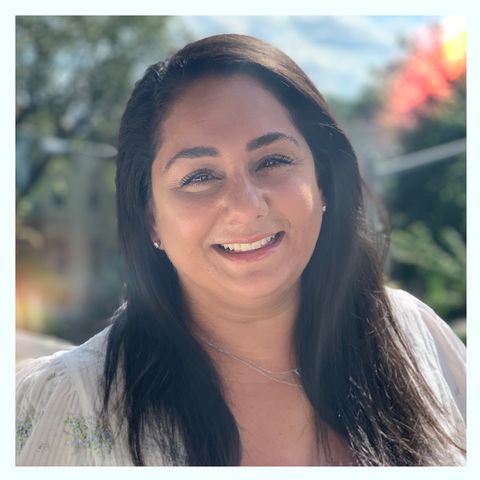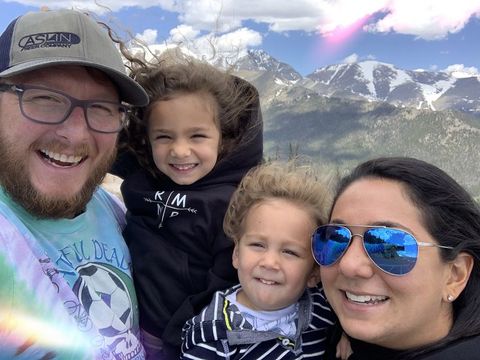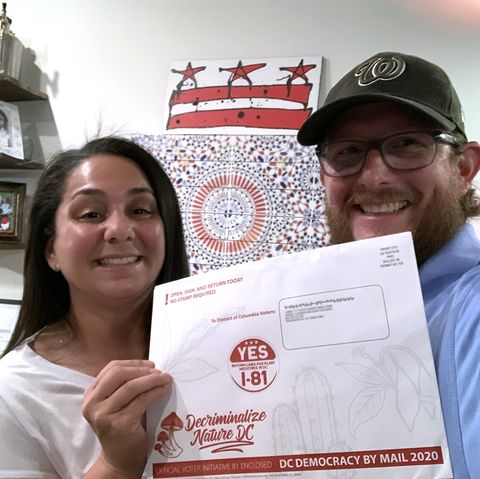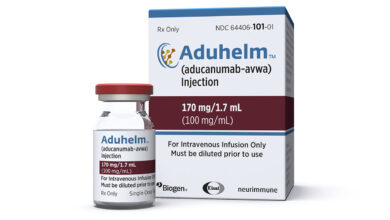Psychedelic Magic Mushrooms Helped Me Cope With Postpartum Depression
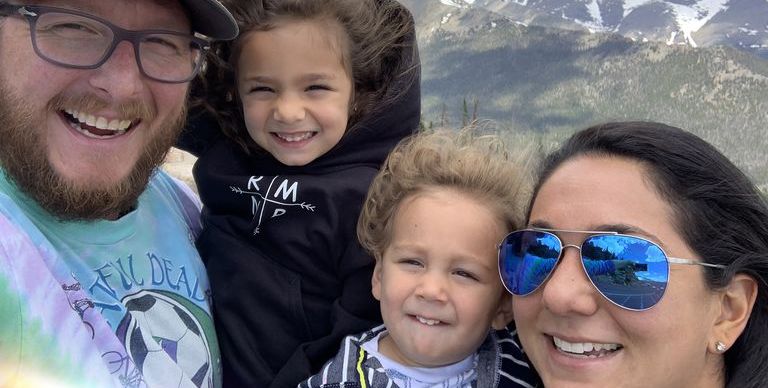
In 2014, during my first pregnancy, I felt happy and healthy almost all the time. I rode my bike to work at the Department of Energy & Environment in Washington, D.C., until I was six or seven months pregnant and took kickboxing classes until about four weeks before my daughter was born.
So it was a bit of a shock when my second pregnancy was so different. Around the four-month mark, I developed sciatica, which is intense nerve pain that runs from your pelvis down your leg. By the end of each day, I could barely walk. I had to crawl up the stairs to the bedroom. Because of the pain, I wasn’t able to be as active as I wanted. Then other parts of my health started to decline — I stopped eating healthy food and doing other things I needed to do to take care of myself physically and mentally.
I developed what’s called antepartum depression, or depression during pregnancy. I had never heard of it, but it’s not uncommon — about 7% of pregnant women experience it, according to the Mayo Clinic, and many more cases may go unreported. My doctor prescribed an antidepressant, which I know is lifesaving for many people, but for personal reasons I decided not to take it.
I tried to manage my pain with over-the-counter pain relievers, heating pads, warm baths and acupuncture, which did provide some short-term relief. I also tried meditating, but I would just sit there hurting, my mind swirling. In the summer of 2017, I delivered my son, Ramsey. He had a head full of curls and for a couple of weeks, all was well. Then he developed GI issues and we had some other challenges. Plus, going from one kid (my daughter Lola was three) to two doesn’t just double the work — it quadruples it. I felt so overwhelmed. Other moms I knew seemed like they had it all together. I thought, why am I the only one who’s struggling? I’d just put on my happy face and pretend like everything was okay. But it wasn’t.
My Downward Spiral and Search for Help
By late 2017, I developed severe postpartum depression. It wasn’t just profound sadness, it was dread. I had a constant chatter of negative self-talk going on, a voice in my head reminding me what a terrible wife and mother I was. I had a therapist, but the depression made me feel so unmotivated, I’d find any excuse not to go.
That fall, my husband Daniel and I drove down to Alabama with the kids to see his parents for Thanksgiving. A friend of mine suggested that we listen to a podcast that he thought might help me, so we turned it on in the car. The guest on the show was Paul Stamets, a mycologist, or mushroom scientist, who was talking about psilocybin, the psychedelic component of some mushrooms, as a treatment for depression. I’ve never taken any kind of psychedelic drug, but at that point, I was open to considering just about anything.
After a ton of research, I began to realize that psychedelics aren’t the hippie drug they used to be considered. In fact, research centers at Johns Hopkins University, New York University and the University of California, Berkeley, have begun to study the potential of psilocybin and other psychedelics to help a range of ills, including depression, anxiety, addition and eating disorders. The treatments are administered in research settings, with therapists in the room to keep watch over a person who has taken a precise dose of psychedelics. The treatment is also often combined with psychotherapy.
I couldn’t get psychedelic therapy at Johns Hopkins, the closest hospital to me that offered it. They required “treatment resistant depression,” and since I didn’t try antidepressants, I didn’t qualify.
Instead, in January 2018, my husband began the process of growing psilocybin mushrooms himself. After a lot of research into legitimate sellers, we ordered mushrooms spores online — it’s legal because the spores themselves don’t contain psylocibin — and started growing them in our bedroom. I don’t recommend anyone do this and we didn’t say a word to anyone about it. Daniel and I were local government employees, and I was taking the biggest risk of my life. Once the spores grew into mushrooms, which do contain psilocybin, we were breaking the law. I was terrified of getting caught and losing everything. But by that point, my mental health was hanging by a thread.
My lowest point was on Valentine’s Day 2018 when Daniel and I went to lunch and I told him I was hearing voices. The look on his face said it all. His way of getting me in front of a professional was to suggest we go to couples’ therapy. And it was true that our marriage was struggling. We were not communicating with each other. We were sleeping on the very edges of the bed. We were constantly fighting. And truthfully it was easier to focus on our marriage than on myself.
Couples therapy provided some relief in our marriage, but it was not addressing the core of my deep depression. Our therapist recommended that I find a one-on-one therapist (I’d stopped going to one I had previously seen), but the time and financial commitment were too much and the depression had stripped me of nearly all my motivation to try to help myself. Finally, by March, I got to the point where I no longer wanted to live. I would fantasize about going to the roof of my building at work and what it would be like to jump. Every time I walked across the street, I envisioned a car turning the corner quickly and hitting me. I had panic attacks about once a week where I would punch my body.
I convinced myself that my kids would be better off with a different woman as their mother. My parents, who are immigrants from Iran, knew what was going on, but depression isn’t really discussed in Iranian culture. My husband told me later that he called my mom several times to try to figure out how to help me, but neither of them really knew what to do. But he picked up all the household duties and childcare and encouraged me to get out of the house. He helped me work through panic attacks and allowed me as much alone time as I needed.
My Risky Decision to Try “Magic” Mushrooms
The first batch of mushrooms matured by April. I wasn’t interested in “tripping,” so after reading deeply about other people’s experiences and dosing approaches, I decided that what’s called “microdosing” was right for me. I bought a small digital scale and measured out the tiniest amount, less than half a gram of a mushroom. I’d eat it with my breakfast and go to work. Again, I don’t recommend this — it’s illegal and I didn’t have a doctor monitoring me. But desperation is a powerful motivator.
I took my first microdose in April, and I started to notice a big difference three days later. Depression had made me feel very detached from my body and a bit disassociated from what was going on around me, like I was just going through the motions. Microdosing mushrooms made me feel very present in my body. There were no hallucinations or other symptoms you might associate with a psychedelic experience. I compare the feeling to getting eight hours of sleep, having a good workout and drinking the perfect amount of coffee. I just felt sharp and ready for my day.
Some of the numbness from depression started to lift. I could smell and taste things like normal again. My husband said I was walking taller, speaking differently and engaging with my children again. As the fog started to lift, I began to get even more invested in my own recovery, and I was motivated to return to one-on-one therapy.
I was microdosing mushrooms about three times a week and starting to feel a lot better, more like myself. But when my supply of mushrooms ran out and after a couple attempts of growing more mushrooms failed, my depression symptoms started to creep back. A friend suggested I try ayahuasca, a hallucinogenic tea made from the leaves of a South American shrub. The practice of drinking it for mental and spiritual healing originated thousands of years ago; the ceremonies are often lead by shamans.
I nervously participated in a few ceremonies. The experience can be difficult to describe, but ayahuasca opened my mind and allowed me to face and process my trauma. It didn’t cure my depression, but after the ceremonies, I began to understand that the solution to my issues is not found in anything or anyone except myself. Knowing that I had all the tools within me already was a powerful feeling.
Sharing What I Learned With My Community
I hated that I had to sneak around and feel ashamed about ingesting two substances, mushrooms and ayahuasca, that literally grow out of the ground. I wanted more people to be aware of the potential benefits of psychedelics, so I started to explore what a campaign in D.C. to legalize entheogens, which are naturally occurring plants or fungi like psilocybin mushrooms, ayahuasca and others that can initiate altered states of consciousness that inspires mental or spiritual growth and healing, would look like. At that time, two U.S. cities, Denver and Oakland, had legalized them, and I reached out to the person who had led the campaign in Denver for advice.
Pretty early on, I realized that if I wanted the referendum, Initiative 81, to be successful, I needed to be the face of the campaign. It’s very disarming when a message about psychedelics comes from a someone who might sit beside you at a PTA meeting. So, I became the Chairwoman of the Campaign to Decriminalize Nature DC and we launched the campaign and website with my story at the center and very credible research about the mental benefits of psychedelics from Johns Hopkins and NYU right alongside it.
I was fully prepared for blowback, to be called a bad mother and wife, but I didn’t get much of that. When we held public meetings, a few people said, ‘these substances could harm children and that’s an unnecessary risk to take.’ But my response was that we have all sorts of things in our homes that can harm children — scissors, knives, alcohol, medication. We protect our kids from these things, and we can protect our kids from entheogens, too.
We actually knew well before voting day that we were going to win. But when I heard the results — 76% of voters approved the referendum — I was shocked. Initiative 81 doesn’t legalize entheogens or reduce penalties for having them. Rather, it decriminalizes them by making planting, buying or using them among the police department’s lowest law enforcement priorities.
Mental health, especially for women and moms, isn’t talked about nearly enough. Everyone feels like they’re the only ones having issues, but the truth is, one in nine new mothers experience postpartum depression. As my name and face came to be associated with the campaign, I found out that a lot of my friends were dealing with similar issues. Some of them hated to be medicated and were so happy to have another potential option. Not to mention that the pandemic has made nearly everyone so stressed and persistently anxious. We’re all just trying to make it through. When this is over, we’re going to have a lot of mental health ramifications to deal with. And I think psychedelics can help play a role in the healing.
This content is created and maintained by a third party, and imported onto this page to help users provide their email addresses. You may be able to find more information about this and similar content at piano.io
Source link


